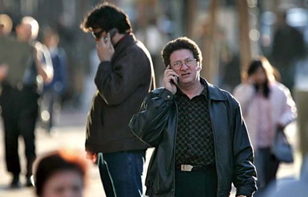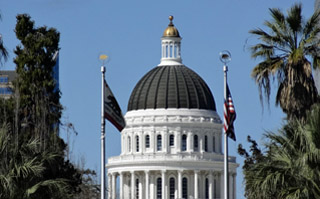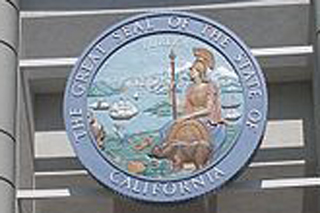Tag Archives: 2015 Legislation
San Jose Mercury News Editorial: Brown’s Veto Damages PUC Reform Effort
by The Editorial Board, San Jose Mercury News

Gov. Jerry Brown’s rejection of crucial reforms of the scandal-plagued California Public Utilities Commission is appalling. … The six bills Brown vetoed would have tightened the rules on communications between utility executives and PUC members to try to halt the pattern of wink-and-nod backroom deals. The most egregious example was helping PG&E get the judge it wanted for a rate-setting hearing. The legislation also outlined simple standards for when a commissioner should be disqualified from a case and added requirements for public meetings. Read More ›
California Increases Scrutiny Of Cellphone Surveillance
by Ali Winston, The Center For Investigative Reporting

The Electronic Communications Privacy Act means law enforcement will need a search warrant for access to digital records, including data, content, metadata and geolocation information stored on a device or server. The law also calls for warrants to search electronic devices, a requirement previously affirmed by the U.S. Supreme Court in a 2014 decision. … The other recently passed law requires local government agencies to notify the public when law enforcement seeks to acquire a cell-site simulator to track transmissions and the location of individual mobile devices. Privacy policies also must be published before such devices can be used. Read More ›
California Now Has The Nation’s Best Digital Privacy Law
by Staff, Wired magazine

[CFC-backed SB 178] enjoyed widespread support among civil libertarians like the American Civil Liberties Union and the Electronic Frontier Foundation. … California has long led the way in privacy protection. Voters amended the state constitution in the 1970s to provide explicit privacy rights far more robust than those guaranteed by the Fourth Amendment of the US Constitution. But while the state amendment ensured a right to privacy for all Californians, lawmakers couldn’t envision the technological advances that would come in the decades to follow. Read More ›
San Bruno Officials Denounce Gov. Brown’s Veto Of CPUC Reforms
by KPIX 5, CBS Local San Francisco

One of the bills Brown vetoed Friday, Senate Bill 660, would have banned ex parte, or private communications, between regulators and utility executives in some proceedings.
Leno, the bill’s author, said it was intended to rebuild public trust in the CPUC. “Ratepayers have already paid dearly for California’s failure to act, and the status quo is simply unacceptable,” Leno said in a statement Friday. “Revelations of backroom deals and breaches of transparency have undermined public trust and weakened public safety. Our efforts to reform the CPUC will continue.” Read More ›
CFC’s 2015 Legislative Agenda: Fate Of 2-Year Bills Now Determined

Consumer Federation of California advocated for or against dozens of bills in the state Legislature this year. Click to read the results for several key pieces of legislation. Read More ›
California Now Allows Firms To Tell Consumers A ‘Made In USA’ Lie
by David Lazarus, Los Angeles Times

Gov. Jerry Brown signed a bill, SB 633, this month that allows California companies to say “made in America” as long as their products are mostly made in America — 90% American-made, to be precise. … Richard Holober, executive director of the Consumer Federation of California, said manufacturers never had trouble in the past meeting the state’s made-in-America rule. Loosening the state’s 100% standard, he said, puts “those businesses who go the extra mile to keep jobs and manufacturing in the USA at a disadvantage” and “gives an advantage to companies that cut corners.” Read More ›
CPUC Reform Bills On Governor’s Desk
by Jaxon Van Derbeken, San Francisco Chronicle

SB660 implements the reforms the law firm called for and closes a loophole that allowed for secret meetings as long as they were one-sided and the commissioners did all the talking. Leno said he is hopeful that Brown will sign the bill. “We took some amendments and we stood our ground on others” in talks with the governor’s office, he said. The resulting bill was passed unanimously by both the state Senate and Assembly. “It is clearly a quality product on a very timely and important issue,” Leno said, adding that the bill would make a difference “to a commission suffering systemic problems.” Read More ›
Uber Unleashes Lobbyists In California To Reshape Driver Rules
by Alison Vekshin, Bloomberg

Uber has spent almost a million dollars since 2013 on lobbyists in California. … Lyft, also based in San Francisco, has spent $362,000 on lobbying the legislature since 2013. … Some lawmakers say Uber is skirting rules that apply to similar businesses. “In California, we allow them to operate for free while we require many other businesses to pay for permits, franchising fees and licenses,” said Assemblyman Adrin Nazarian, the sole vote against Low’s measure in May. “It’s beyond ridiculous what they’re getting away with.” Read More ›
Garnishing California’s Future: New Bill Seeks To Curb Wage Seizures
by Bill Raden, Capital & Main

Unable to keep up payments, loans fall into default and too often result in crippling court-ordered garnishments that claim up to a quarter of earnings. … “People’s lives are being ruined by these very high, 25 percent garnishments – the national maximum – being taken out of their check before they get it home,” [one expert said]. … [SB 501 would] eliminate the current law’s penalty against garnished workers who might want to work more than 40 hours a week. As the law stands now, every additional dollar above $360 a week is taken by the creditor. Read More ›
AB 573: Students Abandoned By Closure Of Corinthian Colleges Turn To Legislature

AB 573 would give all 13,000 former Corinthian students access to legal, financial and academic counseling to help them deal with some of the obstacles they face, such as retrieving their Corinthian files and determining whether the students are eligible to have their federal education loans discharged. The bill would fund outreach efforts to identify eligible students, and it would facilitate and encourage the transfer of academic credits earned at Corinthian Colleges to the California Community Colleges system. Read More ›
Facing Regulatory Roadblocks, Uber Ramps Up Its Lobbying In California
by Chris Kirkham and Tracey Lien, Los Angeles Times

Uber now spends more on lobbyists in California than Wal-Mart, Bank of America or Wells Fargo … in the top 3% of companies and organizations. … So far in 2015, Uber has paid about $200,000 to lobbyists. That’s more than 10 times the amount spent by the limousine industry and nearly four times greater than the taxi industry’s trade group. … A PUC administrative law judge decided earlier this month that Uber should be fined $7.3 million and suspended from operating in California. Read More ›
Key CPUC Reform Gets Unplugged
by Jeff McDonald, San Diego Union-Tribune

When parties believe the commission has failed to follow the law in making a decision, their only option is to make that case to the commission itself, not a judge. If the commission rejects the challenge, the case can be taken to a state appeals panel, which may review the matter. … The utilities commission is in a rare position among government agencies, in being entrusted as an impartial arbiter of its own decisions. If a City Council makes a decision that runs counter to the state Government Code or other laws, a citizen can take the matter to court. Read More ›
California Senate OKs Requiring Warrants To Search Smartphones, Tablets
by Patrick McGreevy, Los Angeles Times

“What the bill does is brings our state statute into the 21st century to catch up with technology with regards to privacy,” [bill author Senator Mark] Leno told his colleagues. “Of course law enforcement needs a warrant before it can go into your mailbox and read your mail, but it does not currently need a warrant to read your emails or text communications or other electronic communications.” … Leno introduced a similar bill two years ago but it was vetoed by Gov. Jerry Brown. Read More ›